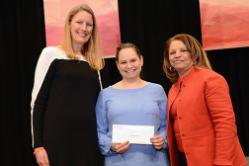July 16, 2015
Amanda Sisselman Recognized with Altes Award for Exemplary Community Service

Amanda Sisselman (center) poses with President Merodie A. Hancock, and last year's Altes Award recipient, Catherine Collins.
Amanda Sisselman is this year’s recipient of the Altes Prize for Exemplary Community Service. Sisselman, who is a mentor in Community and Human Services at the college’s Staten Island location, is a clinical social worker and community-based researcher. She was awarded the prize because her colleagues believe that her work epitomizes the Altes Prize’s goal of recognizing faculty members who use their academic expertise to enrich and serve the community. Her accomplishment will be celebrated at an open house this fall.
“I am honored to receive this prestigious award,” said Sisselman. “My colleagues here at Empire State College are always very supportive of my community work. I find the work to be very rewarding and I look forward to including the folks that I work with in the community in the celebration.”
“We recognize a faculty member with the Altes Prize every year,” said President Merodie A. Hancock, “and it’s always a tough call to select just one person, because so many of our faculty are involved in good work in their communities, bringing their academic expertise to bear on issues from homelessness to at-risk girls, to health-care disparities among African-American women, to the needs of seniors. I am very pleased that Amanda’s work with schools and children has been recognized by her colleagues and I am proud of each and every one of our faculty who extend themselves above and beyond, as Amanda has, for the betterment of others.”
Sisselman’s research encompasses school-based health centers and child welfare programs, and her expertise has been tapped to develop life-skills empowerment programs at a major metropolitan-area university. She is actively expanding these programs to other locations, and has secured grant funding to make these programs possible.
“Through partnerships with colleagues, community internships and research opportunities for her students, Sisselman successfully integrates her community work with her mentoring and teaching, exemplifying the spirit of community service and enrichment recognized by the Altes Prize,” said Dean Cynthia Ward of the college’s New York City locations.
About the Jane W. and Wally Altes Prize for Exemplary Community Service
The Altes Prize for Exemplary Community Service is presented annually to a faculty member whose outstanding community service utilizes research and insights from his or her academic discipline to address pressing social problems. The award was established by Jane and Wally Altes. Jane served as the college’s long-time vice president for academic affairs and also as interim president. The award will be presented at a community open house at the recipient’s center later in the year.
About Empire State College
Empire State College, the nontraditional, open college of the SUNY system, educates more than 20,000 students worldwide at eight international sites, more than 35 locations in the state of New York, online, as well as face to face and through a blend of both, at the associate, bachelor’s and master’s levels.
The average age of an undergraduate student at the college is 35 and graduate students’ average age is 40.
Most Empire State College students are working adults. Many are raising families and meeting civic commitments in the communities where they live, while studying part time.
In addition to awarding credit for prior college-level learning, the college pairs each undergraduate student with a faculty mentor who supports that student throughout his or her college career.
Working with their mentors, students design an individual degree program and engage in guided independent study and course work onsite, online or through a combination of both, which provides the flexibility for students to choose where, when and how to learn.
Students have the opportunity to enroll five times during the year.
The college’s 73,000 alumni are active in their communities as entrepreneurs, politicians, business professionals, artists, nonprofit agency employees, teachers, veterans and active military, union members and more.
The college was first established in 1971 by the SUNY Board of Trustees with the encouragement of the late Ernest L. Boyer, chancellor of the SUNY system from 1970 to 1977.
Boyer also served as United States commissioner of education during the administration of President Jimmy Carter and then as president of the Carnegie Foundation for the Advancement of Teaching.
More information about the college is available at www.esc.edu.
###
Media contact: David Henahan, director of communications
518-587-2100, ext. 2918
David.Henahan@esc.edu
518-321-7038 (after hours and on weekends)
